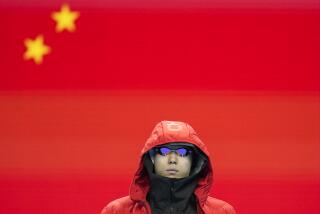WORLD SPORTS SCENE / RANDY HARVEY : Success of Chinese Raises Suspicions
- Share via
STUTTGART, Germany — Many found perches throughout the city from where they could watch the Chinese fireworks one night last week, jamming traffic for hours. But no one complained because the show was spectacular, hardly surprising considering the Chinese invented fireworks.
Somewhat less appreciated was the success of the Chinese female runners in track and field’s World Championships, which ended Sunday. The Chinese do not claim to have invented running, and, until recently, they have not been particularly accomplished at it. So questions have been raised.
“Nasty Spectacle,” was the headline one day last week on a column written by Germany’s Dieter Baumann, the 1992 Olympic 5,000-meter champion, for a local newspaper, Stuttgarter Zeitung.
This spectacle started on the third night of the championships, when the Chinese finished 1-2-3 in the 3,000 meters. Their times at the finish were not exceptional because of a tactical first 800 meters, but the winner, Qu Yunxia, ran the final 2,000 in a time that would rank as the fifth-best ever for that distance, the final 800 in a fast 2:03 and, like her teammates, hardly appeared winded during a victory lap.
Qu had only the 73rd-best time in the world in the 3,000 last year, which was 26 seconds slower than her winning time in the World Championships, but she at least entered the race with credentials. She finished third in the 1,500 in the 1992 Olympics.
But the silver and bronze medalists, Zhang Linli and Zhang Lirong, were not ranked among the top 35 in any event last year, and although Lirong had showed promise this summer, Linli came from the twilight zone. Breaking the world junior record, she bettered her personal best in the final by 16 seconds.
The story was similar in the 10,000 Saturday night, when the Chinese women finished 1-2. The silver medalist, Zhong Huandi, was fourth in the Olympics last summer, but the winner, Wang Junxia, had only the 56th-best time in the world in 1992. Her winning time was 1 minute 40 seconds faster than her previous best entering this year.
And, on Sunday, in the 1,500, China’s Dong Liu beat her personal record by almost five seconds, winning in 4:00.50. Another Chinese woman was fourth.
“It’s inexplicable,” American Lynn Jennings said of the Chinese success after her fifth-place finish in the 10,000.
Perhaps. But speculation is rampant, and not only in Dieter Baumann’s column. It is based largely on the fact that the Chinese system, although not structured exactly like the ones in the Soviet Union and East Germany, has employed numerous coaches from those former sports powers.
“We asked the Chinese if they still have any East German coaches,” Evie Dennis, a USA Track & Field official, said last week. “They said, ‘Not at the elite level, but the provinces have some.’ That’s like us saying, ‘We don’t have any, but California does.’ ”
Of course, “East German coaches” is a euphemism in the sport for illegal, performance-enhancing drugs, which fueled East Germany’s so-called “Miracle Machine.”
Denying that the Chinese are benefiting from the same pharmacologic advances, the vice president of their track and field federation, Lou Dapeng, said last week: “In China, we are also against drugs. We have programs for drug control in competition and out of competition.”
The International Amateur Athletic Federation, which governs the sport, has found no evidence that the Chinese are less vigilant than other countries. Granted permanent visas to conduct random, out-of-competition tests in China, the IAAF has found three positives in 50 samples during the last 16 months.
Six percent is not low. But because of the cooperation they have received from the Chinese, IAAF officials do not appear concerned that the problem is state-controlled, as it was in East Germany.
Doubts persist, however.
That suspicion is creating a dilemma for the International Olympic Committee, which will vote one month from today on whether to award the 2000 Summer Games to Beijing, China, or another, less mysterious city, such as Sydney, Australia, or Manchester, England.
On one hand, the Chinese have enhanced their bid with their improvement in track and field. As proud as they are of their accomplishments in the World Championships, they were even more encouraged by last year’s world junior championships, in which their women won eight of 19 gold medals. The IOC presumes that the prospect of Chinese victories in the sport in 2000 would attract large, enthusiastic crowds to the main stadium.
On the other hand, the IOC must worry that a sports drug scandal would taint its selection of Beijing. IOC President Juan Antonio Samaranch, who was in Stuttgart on Saturday night, could not have helped but notice the derisive whistling from the crowd directed toward the Chinese women during their 10,000-meter victory lap.
The allegations against the Chinese have just arrived in track and field, but they are not new in international sports. Swimming coaches from throughout the world voiced their mistrust of the Chinese when they began to emerge as a power in the 1990 Asian Games, suspicions that were repeated during last summer’s Olympics.
In the 1992 Winter Olympics, Chinese speedskater Ye Quiaobo went to a news conference after her second-place finish to Bonnie Blair in the 500 meters and gave a poignant, tearful account, in English, of the nightmare she lived through in 1988, when she tested positive for a steroid. Quiaobo said the drug was fed to her, along with her daily vitamin supplements, without her knowledge by her Chinese coach.
A few days later, after another second-place finish to Blair in the 1,000, Quiaobo attended another news conference. But, with handlers hovering over her, she spoke only about the race and only in Chinese.
More to Read
Go beyond the scoreboard
Get the latest on L.A.'s teams in the daily Sports Report newsletter.
You may occasionally receive promotional content from the Los Angeles Times.






